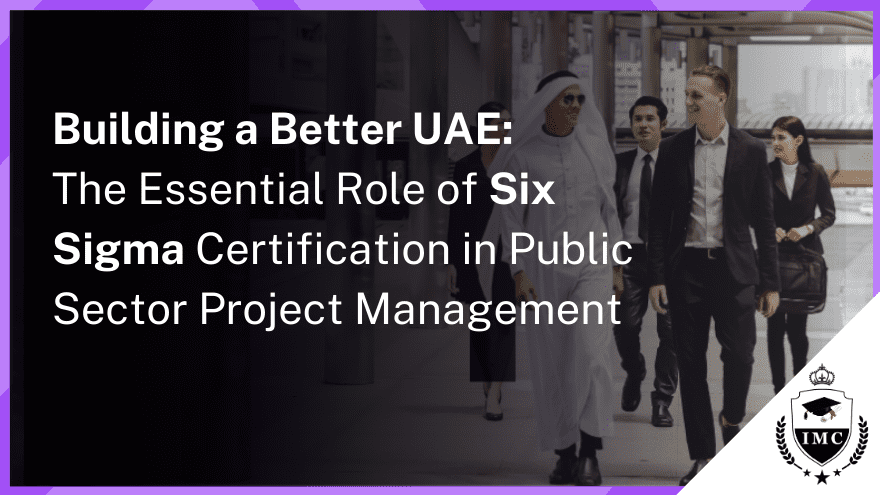The United Arab Emirates (UAE) is renowned for its ambitious public sector projects, shaping a landscape of innovation and progress. From developing world-class infrastructure to implementing cutting-edge social programs, these initiatives are the cornerstone of the UAE continued success. However, managing these projects effectively requires navigating complex stakeholder groups, adhering to stringent regulations, and ensuring responsible stewardship of public funds. Six Sigma certification emerges as a powerful tool in this context. It equips professionals with a globally recognized methodology for process improvement and efficiency. This data-driven approach focuses on minimizing defects and maximizing customer satisfaction, making it ideal for the public sector in the UAE.
Why is Six Sigma Certification Important for Public Sector Projects in the UAE?
Public sector projects in the UAE often face:
Limited Resources: Six Sigma equips individuals with strategies to optimize resource allocation and deliver projects efficiently within budget constraints. This is especially important in the UAE, where maintaining fiscal responsibility is paramount.
Stakeholder Engagement: Effective communication and collaboration with a diverse range of stakeholders, including government agencies, private businesses, and the local community, are crucial for project success. Six Sigma training emphasizes clear communication and data-driven decision making, fostering trust and ensuring projects align with the UAE vision.
Risk Management: Six Sigma methodology equips individuals with tools to proactively identify, mitigate, and prevent risks before they disrupt project timelines or budgets. This is vital for safeguarding the UAE's ambitious public sector initiatives.
Compliance and Regulations: Public projects in the UAE must adhere to specific regulations and quality standards. Six Sigma training emphasizes a strong understanding of process control and adherence to best practices, reducing the risk of non-compliance issues and ensuring transparency in public spending.
Benefits of Six Sigma Certification for Public Sector Professionals in the UAE:
Increased Efficiency and Effectiveness: Six Sigma certified professionals bring a structured approach to project management, leading to improved efficiency, cost savings, and higher project success rates. This translates to faster completion times, better resource utilization, and ultimately, greater value delivered for public projects in the UAE.
Enhanced Credibility and Recognition: Six Sigma certification is a well-respected credential globally. It demonstrates an individual's commitment to continuous improvement and data-driven decision making, qualities highly valued in the UAE's public sector.
Improved Communication and Collaboration: Six Sigma training emphasizes data analysis and clear communication, fostering stronger relationships with stakeholders. This leads to better project outcomes and strengthens public trust in government institutions across the UAE.
Career Advancement Opportunities: Six Sigma certification can open doors to career advancement within the UAE's public sector. As government organizations increasingly recognize the value of data-driven project management, Six Sigma certified professionals become highly sought-after.
Building a Future-Ready UAE with Six Sigma
Six Sigma certification provides a data-driven framework to address the unique challenges faced by public sector projects in the UAE. Professionals gain a structured methodology for:
Improving Project Efficiency and Optimizing Resource Allocation: Six Sigma focuses on streamlining processes, eliminating waste, and maximizing resource utilization. This leads to cost savings and efficient use of public funds, allowing the UAE government to invest strategically in its future.
Effective Stakeholder Management and Collaboration: By emphasizing data-driven decision making and clear communication, Six Sigma fosters trust and collaboration with stakeholders, ensuring projects align with the UAE's ambitious development goals.
Upholding Ethical and Professional Conduct: Six Sigma promotes a culture of data-driven decision making and continuous improvement, aligning well with the UAE's focus on transparency and accountability in public service.
Enhancing Project Quality and Customer Satisfaction: Six Sigma emphasizes defect prevention and a customer-centric approach. Public sector professionals can leverage this methodology to deliver high-quality projects that meet or exceed stakeholder expectations, ultimately contributing to a higher quality of life for UAE citizens and residents.
Six Sigma Green Belt Certification
Certification:
On successful completion of the course and course requisites, the candidate will receive Internationally recognized Six Sigma Green Belt Certification.
Six Sigma Black Belt Certification:
Focus: Leading complex improvement projects and driving enterprise-wide change within the supply chain function.
Certification:
On successful completion of the course and course requisites, the candidate will receive Internationally recognized Lean Six Sigma Black Belt Certification.
Investing in a Sustainable Future
By empowering professionals with Six Sigma certification, public sector organizations in the UAE can cultivate a workforce equipped to deliver successful projects. These projects contribute directly to the UAE's vision for the future, ensuring efficient infrastructure development, effective social program implementation, and a continued focus on innovation and progress for the benefit of all.
Summary
The UAE ambitious public sector projects require efficient management to deliver on their vision. Six Sigma certification equips professionals with data-driven tools to optimize resources, collaborate effectively with stakeholders, mitigate risks, and adhere to regulations. By applying Six Sigma, public sector projects in the UAE can achieve greater efficiency, improve communication, and ultimately deliver high-quality initiatives that benefit the country's residents and propel it towards a sustainable future.






